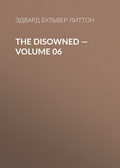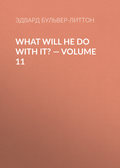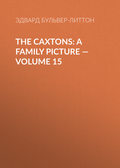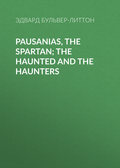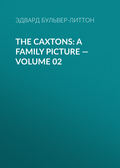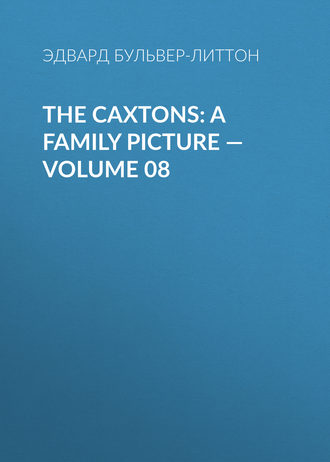
Эдвард Бульвер-Литтон
The Caxtons: A Family Picture — Volume 08
PART VIII
CHAPTER I
There entered, in the front drawing-room of my father's house in Russell Street, an Elf! clad in white,—small, delicate, with curls of jet over her shoulders; with eyes so large and so lustrous that they shone through the room as no eyes merely human could possibly shine. The Elf approached, and stood facing us. The sight was so unexpected and the apparition so strange that we remained for some moments in startled silence. At length my father, as the bolder and wiser man of the two, and the more fitted to deal with the eerie things of another world, had the audacity to step close up to the little creature, and, bending down to examine its face, said, "What do you want, my pretty child?"
Pretty child! Was it only a pretty child after all? Alas! it would be well if all we mistake for fairies at the first glance could resolve themselves only into pretty children.
"Come," answered the child, with a foreign accent, and taking my father by the lappet of his coat, "come, poor papa is so ill! I am frightened! come, and save him."
"Certainly," exclaimed my father, quickly. "Where's my hat, Sisty?
Certainly, my child; we will go and save papa."
"But who is papa?" asked Pisistratus,—a question that would never have occurred to my father. He never asked who or what the sick papas of poor children were when the children pulled him by the lappet of his coat. "Who is papa?"
The child looked hard at me, and the big tears rolled from those large, luminous eyes, but quite silently. At this moment a full-grown figure filled up the threshold, and emerging from the shadow, presented to us the aspect of a stout, well-favored young woman. She dropped a courtesy, and then said, mincingly,—
"Oh, miss, you ought to have waited for me, and not alarmed the gentlefolks by running upstairs in that way! If you please, sir, I was settling with the cabman, and he was so imperent,—them low fellows always are, when they have only us poor women to deal with, sir, and—"
"But what is the matter?" cried I, for my father had taken the child in his arms soothingly, and she was now weeping on his breast.
"Why, you see, sir [another courtesy], the gent only arrived last night at our hotel, sir,—the Lamb, close by Lunnun Bridge,—and he was taken ill, and he's not quite in his right mind like; so we sent for the doctor, and the doctor looked at the brass plate on the gent's carpet- bag, sir, and then he looked into the 'Court Guide,' and he said, 'There is a Mr. Caxton in Great Russell Street,—is he any relation?' and this young lady said, 'That's my papa's brother, and we were going there.' And so, sir, as the Boots was out, I got into a cab, and miss would come with me, and—"
"Roland—Roland ill! Quick, quick, quick!" cried my father, and with the child still in his arms he ran down the stairs. I followed with his hat, which of course he had forgotten. A cab, by good luck, was passing our very door; but the chambermaid would not let us enter it till she had satisfied herself that it was not the same she had dismissed. This preliminary investigation completed, we entered and drove to the Lamb.
The chambermaid, who sat opposite, passed the time in ineffectual overtures to relieve my father of the little girl,—who still clung nestling to his breast,—in a long epic, much broken into episodes, of the causes which had led to her dismissal of the late cabman, who, to swell his fare, had thought proper to take a "circumbendibus!"—and with occasional tugs at her cap, and smoothings down of her gown, and apologies for being such a figure, especially when her eyes rested on my satin cravat, or drooped on my shining boots.
Arrived at the Lamb, the chambermaid, with conscious dignity, led us up a large staircase, which seemed interminable. As she mounted the region above the third story, she paused to take breath and inform us, apologetically, that the house was full, but that if the "gent" stayed over Friday, he would be moved into No. 54, "with a look-out and a chimbly." My little cousin now slipped from my father's arms, and, running up the stairs, beckoned to us to follow. We did so, and were led to a door, at which the child stopped and listened; then, taking off her shoes, she stole in on tiptoe. We entered after her.
By the light of a single candle we saw my poor uncle's face; it was flushed with fever, and the eyes had that bright, vacant stare which it is so terrible to meet. Less terrible is it to find the body wasted, the features sharp with the great life-struggle, than to look on the face from which the mind is gone,—the eyes in which there is no recognition. Such a sight is a startling shock to that unconscious habitual materialism with which we are apt familiarly to regard those we love; for in thus missing the mind, the heart, the affection that sprang to ours, we are suddenly made aware that it was the something within the form, and not the form itself, that was so dear to us. The form itself is still, perhaps, little altered; but that lip which smiles no welcome, that eye which wanders over us as strangers, that ear which distinguishes no more our voices,—the friend we sought is not there! Even our own love is chilled back; grows a kind of vague, superstitious terror. Yes, it was not the matter, still present to us, which had conciliated all those subtle, nameless sentiments which are classed and fused in the word "affection;" it was the airy, intangible, electric something, the absence of which now appals us.
I stood speechless; my father crept on, and took the hand that returned no pressure. The child only did not seem to share our emotions, but, clambering on the bed, laid her cheek on the breast, and was still.
"Pisistratus," whispered my father at last, and I stole near, hushing my breath,—"Pisistratus, if your mother were here!"
I nodded; the same thought had struck us both. His deep wisdom, my active youth, both felt their nothingness then and there. In the sick chamber both turned helplessly to miss the woman.
So I stole out, descended the stairs, and stood in the open air in a sort of stunned amaze. Then the tramp of feet, and the roll of wheels, and the great London roar, revived me. That contagion of practical life which lulls the heart and stimulates the brain,—what an intellectual mystery there is in its common atmosphere! In another moment I had singled out, like an inspiration, from a long file of those ministrants of our Trivia, the cab of the lightest shape and with the strongest horse, and was on my way, not to my mother's, but to Dr. M— H—, Manchester Square, whom I knew as the medical adviser to the Trevanions. Fortunately, that kind and able physician was at home, and he promised to be with the sufferer before I myself could join him. I then drove to Russell Street, and broke to my mother, as cautiously as I could, the intelligence with which I was charged.
When we arrived at the Lamb, we found the doctor already writing his prescription and injunctions: the activity of the treatment announced the clanger. I flew for the surgeon who had been before called in. Happy those who are strange to that indescribable silent bustle which the sick-room at times presents,—that conflict which seems almost hand to hand between life and death,—when all the poor, unresisting, unconscious frame is given up to the war against its terrible enemy the dark blood flowing, flowing; the hand on the pulse, the hushed suspense, every look on the physician's bended brow; then the sinapisms to the feet, and the ice to the head; and now and then, through the lull of the low whispers, the incoherent voice of the sufferer,—babbling, perhaps, of green fields and fairyland, while your hearts are breaking! Then, at length, the sleep,—in that sleep, perhaps, the crisis,—the breathless watch, the slow waking, the first sane words, the old smile again, only fainter, your gushing tears, your low "Thank God thank God!"
Picture all this! It is past; Roland has spoken, his sense has returned; my mother is leaning over him; his child's small hands are clasped round his neck; the surgeon, who has been there six hours, has taken up his hat, and smiles gayly as he nods farewell; and my father is leaning against the wall, his face covered with his hands.



